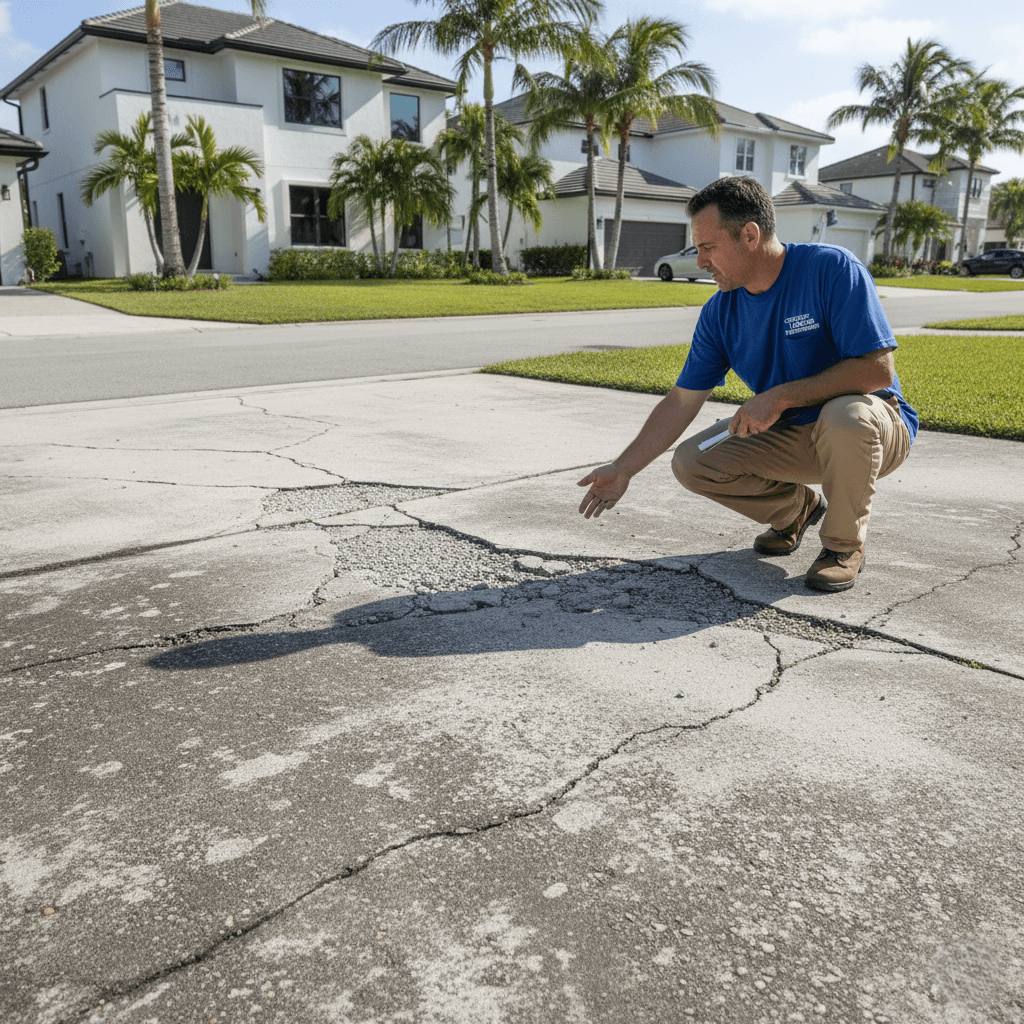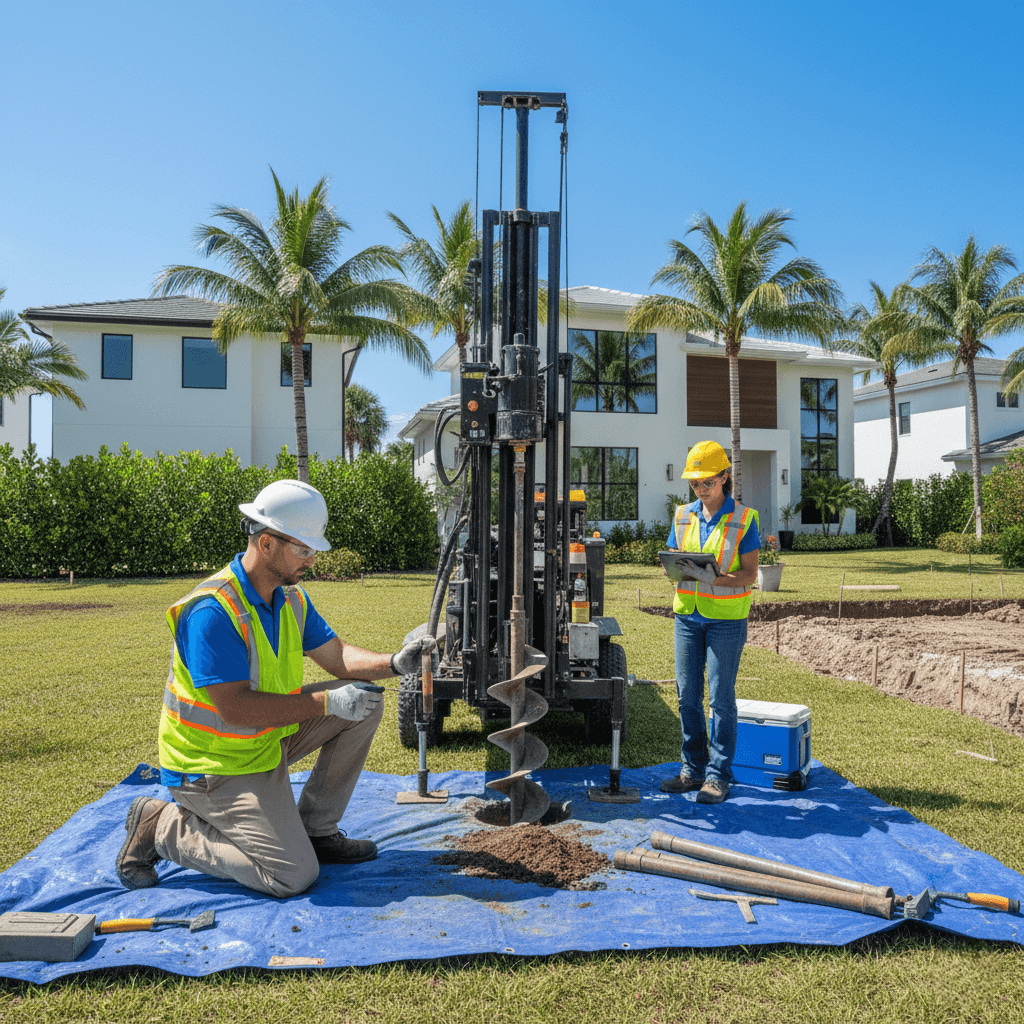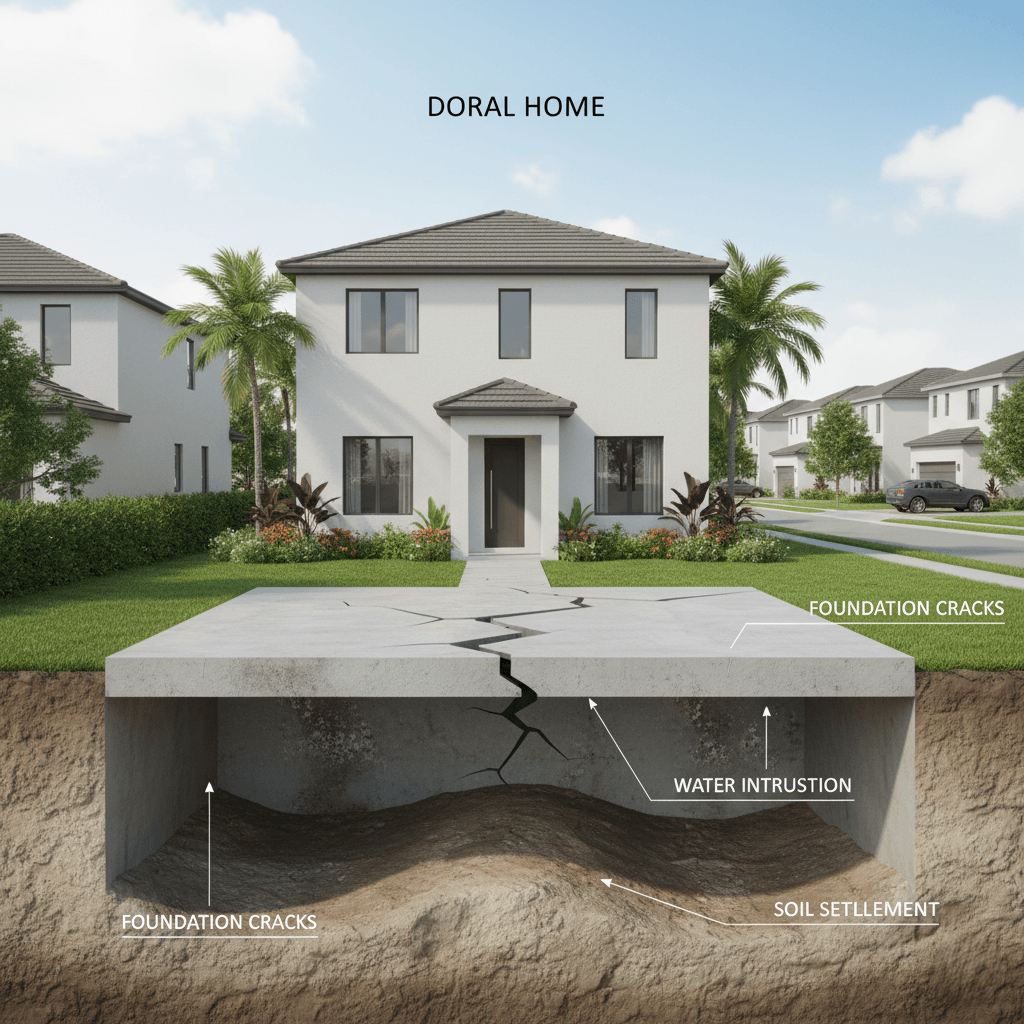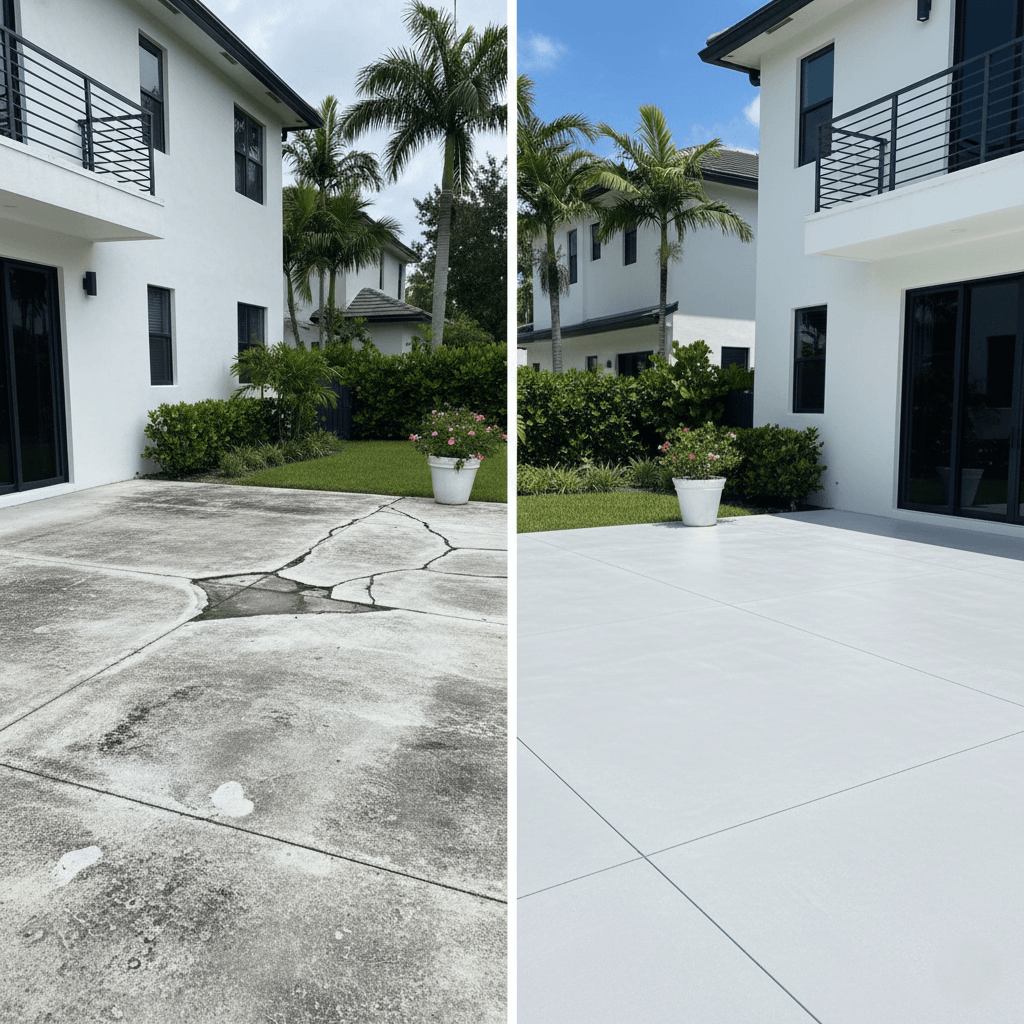
Why Soil Testing Matters Before Pouring a Concrete Slab in Doral
Concrete Slab Doral
Proper soil testing represents one of the most critical steps before installing any concrete slab in Doral, determining both immediate construction success and long-term structural performance. South Florida’s unique geological conditions create specific challenges that require professional assessment to avoid costly failures and safety hazards. Understanding soil composition, bearing capacity, drainage characteristics, and reactivity helps ensure concrete slabs perform optimally throughout their service life. Miami-Dade County’s building codes mandate specific testing requirements that protect both property owners and the community from structural problems. Investing in comprehensive soil analysis before concrete installation prevents expensive repairs while ensuring compliance with local regulations and engineering standards.

Doral’s Unique Soil Composition and Challenges
Doral’s geological foundation consists primarily of limestone bedrock overlaid with varying depths of sand, clay, and organic materials that create complex construction challenges. The area’s proximity to the Everglades and coastal influences results in high water tables, variable soil densities, and potential for settlement issues that affect concrete slab performance. Calcareous soils common in Miami-Dade County contain up to 80% calcium carbonate, significantly different from typical soils found elsewhere.
These unique conditions require specialized testing protocols and interpretation by professionals familiar with South Florida geology. Properties near Trump National Doral and CityPlace Doral may encounter different soil characteristics within short distances, making site-specific testing essential rather than relying on neighboring property data. Understanding these local variations helps predict how concrete slabs will perform under various loading and environmental conditions.
Water Table and Drainage Considerations
High water tables throughout Doral create challenges for concrete slab installations, particularly affecting curing processes and long-term durability. Seasonal water level fluctuations during wet and dry periods can cause soil movement that stresses concrete slabs if not properly addressed during design and installation phases.
Essential Soil Testing Parameters
Comprehensive soil testing for concrete slab projects examines multiple parameters that influence foundation design and construction methods. Soil bearing capacity determines the maximum load the ground can support without excessive settlement, typically ranging from 1,500 to 4,000 pounds per square foot, depending on soil type and compaction. Testing also evaluates soil reactivity, measuring how much the ground expands and contracts with moisture changes.
Compaction testing ensures adequate soil density to support concrete loads without settlement. Professional geotechnical engineers conduct Standard Penetration Tests (SPT) and other field evaluations to assess in-situ soil conditions. Laboratory analysis of soil samples provides detailed information about composition, corrosivity potential, and engineering properties necessary for proper concrete slab design.
Corrosivity and Chemical Analysis
Soil chemistry testing identifies potential corrosion hazards to concrete and embedded reinforcement, particularly important in Doral’s coastal environment. Chloride content, pH levels, and sulfate concentrations can significantly affect concrete durability and require specific protective measures during construction.
Florida Building Code Requirements
The Florida Building Code mandates soil testing for most concrete slab installations, particularly those supporting structures or exceeding specific size thresholds. Chapter 18 of the Florida Building Code addresses soils and foundations, requiring professional geotechnical evaluation for projects where soil conditions may affect structural performance. Miami-Dade County enforces additional requirements due to unique local conditions and hurricane exposure.
Testing must be conducted by licensed geotechnical engineers using approved methods and equipment. Results must demonstrate adequate soil bearing capacity, proper compaction levels, and suitable drainage characteristics before building permits are issued. Properties in the Doral Central Park area and other established neighborhoods may have different requirements based on known soil conditions and previous construction experience.
Permit and Inspection Requirements
Building permits for concrete slabs typically require geotechnical reports demonstrating compliance with bearing capacity and compaction standards. Inspections during construction verify that soil preparation meets approved specifications before concrete placement begins.
Preventing Settlement and Structural Problems
Inadequate soil preparation represents the primary cause of concrete slab failures, leading to cracking, differential settlement, and structural damage that can cost thousands to repair. Proper testing identifies problematic soils that require remediation, such as loose fill materials, organic deposits, or expansive clays that change volume with moisture fluctuations.
Professional soil analysis determines appropriate foundation design, including slab thickness requirements, reinforcement specifications, and necessary soil improvements. Properties near Downtown Doral with varying soil conditions benefit significantly from comprehensive testing that identifies potential problem areas before construction begins.
Long-term Performance Benefits
Quality soil testing and preparation extend concrete slab life while minimizing maintenance requirements. Properly designed foundations based on accurate soil data resist settlement, cracking, and moisture-related problems that affect inferior installations.
Cost-Benefit Analysis of Soil Testing
While soil testing represents an upfront investment typically ranging from $1,500 to $5,000, depending on project scope, the cost pales compared to potential repair expenses from inadequate soil preparation. Foundation problems can cost $10,000 to $50,000 or more to correct, making initial testing extremely cost-effective insurance against future issues.
Testing results guide appropriate construction methods that may actually reduce overall project costs by identifying the most efficient foundation approach for specific site conditions. Properties with excellent soil conditions may require less reinforcement or thickness, while problematic soils identified early allow for proper remediation rather than expensive post-construction repairs.
Insurance and Warranty Considerations
Many contractors and warranty programs require documented soil testing to validate coverage for foundation-related issues. Proper testing provides legal protection and supports insurance claims if unforeseen soil problems arise despite professional evaluation.
Types of Soil Tests for Concrete Slabs
Standard Penetration Tests (SPT) measure soil density and bearing capacity at various depths, providing essential data for foundation design. These tests involve driving sampling equipment into the ground while measuring resistance, revealing soil layers, and strength characteristics. Boring logs document soil conditions throughout the depth of investigation, typically extending well below proposed foundation levels.
Compaction tests determine optimal moisture content and achievable density for soil preparation. Laboratory analysis of samples provides detailed engineering properties, including grain size distribution, plasticity characteristics, and chemical composition. Specialized tests may evaluate corrosivity potential, drainage rates, and expansion characteristics relevant to specific project requirements.
Field Testing Procedures
Professional soil testing follows established protocols using calibrated equipment and certified procedures. Field technicians collect representative samples while documenting conditions, groundwater levels, and other factors affecting concrete slab performance.
Interpreting Geotechnical Reports
Geotechnical reports translate complex soil data into practical construction recommendations, including allowable bearing pressures, required compaction levels, and necessary soil improvements. These documents specify concrete slab design parameters such as minimum thickness, reinforcement requirements, and vapor barrier needs based on actual site conditions.
Professional engineers experienced with Doral’s conditions provide recommendations tailored to local challenges, including high water tables, variable soil conditions, and hurricane wind loads. Reports typically include specific construction procedures, quality control requirements, and maintenance recommendations for optimal long-term performance.
Implementation During Construction
Geotechnical recommendations guide every aspect of soil preparation and concrete installation, from excavation procedures through final placement and curing. Following these specifications ensures the concrete slab performs as designed while meeting building code requirements.
Soil Improvement and Remediation Options
When testing reveals problematic soil conditions, various improvement techniques can create suitable foundations for concrete slabs. Mechanical compaction using proper equipment and moisture control improves loose or inadequately prepared soils. Chemical stabilization using lime or cement can strengthen weak soils while reducing expansion potential.
Over-excavation and replacement with engineered fill provide reliable foundations where existing soils are unsuitable. Drainage improvements, including French drains or dewatering systems, address high groundwater issues that affect concrete performance. These remediation methods, when properly implemented based on soil testing results, create stable foundations for long-lasting concrete installations.
Quality Control During Improvement
Soil improvement work requires ongoing testing to verify the achievement of specified results. Compaction testing confirms adequate density while moisture monitoring ensures optimal conditions for chemical stabilization treatments.
Seasonal and Environmental Considerations
Florida’s seasonal weather patterns affect both soil testing and concrete slab installation timing. Wet season conditions may reveal drainage issues not apparent during dry periods, while hurricane season preparations require additional consideration of wind uplift and flood resistance. Testing should account for these seasonal variations to ensure year-round performance.
Salt air intrusion near coastal areas affects both soil chemistry and concrete durability, requiring specific protective measures identified through comprehensive testing. Understanding these environmental factors helps optimize concrete slab design for Doral’s challenging subtropical climate.
Climate Change Adaptations
Rising sea levels and increasing storm intensity may affect future soil and groundwater conditions, making current testing results even more valuable for long-term planning and adaptation strategies.
Selecting Qualified Testing Professionals
Choosing experienced geotechnical engineers familiar with South Florida conditions ensures accurate testing and appropriate recommendations for local challenges. Licensed professionals understand Miami-Dade County requirements, local soil characteristics, and effective remediation techniques for common problems encountered in the region.
Quality testing firms use calibrated equipment, follow established protocols, and provide comprehensive reports that support permitting and construction activities. Their expertise helps navigate complex soil conditions while ensuring compliance with building codes and engineering standards.
Making Informed Decisions
Comprehensive soil testing provides the foundation for informed decision-making about concrete slab projects, from initial feasibility through construction methods and long-term maintenance planning. Understanding site conditions helps select appropriate contractors, materials, and construction techniques that ensure successful outcomes.
Professional soil analysis protects property investments while providing peace of mind that concrete slabs will perform safely and reliably for decades. The relatively small investment in quality testing yields significant returns through improved performance, reduced maintenance costs, and protection against costly structural problems.
At Doral Concrete Works, we understand the critical importance of proper soil testing before any concrete slab installation. Our experience with local conditions and commitment to quality construction ensure every project begins with thorough site evaluation and appropriate soil preparation for lasting concrete slab performance that meets the highest standards.


